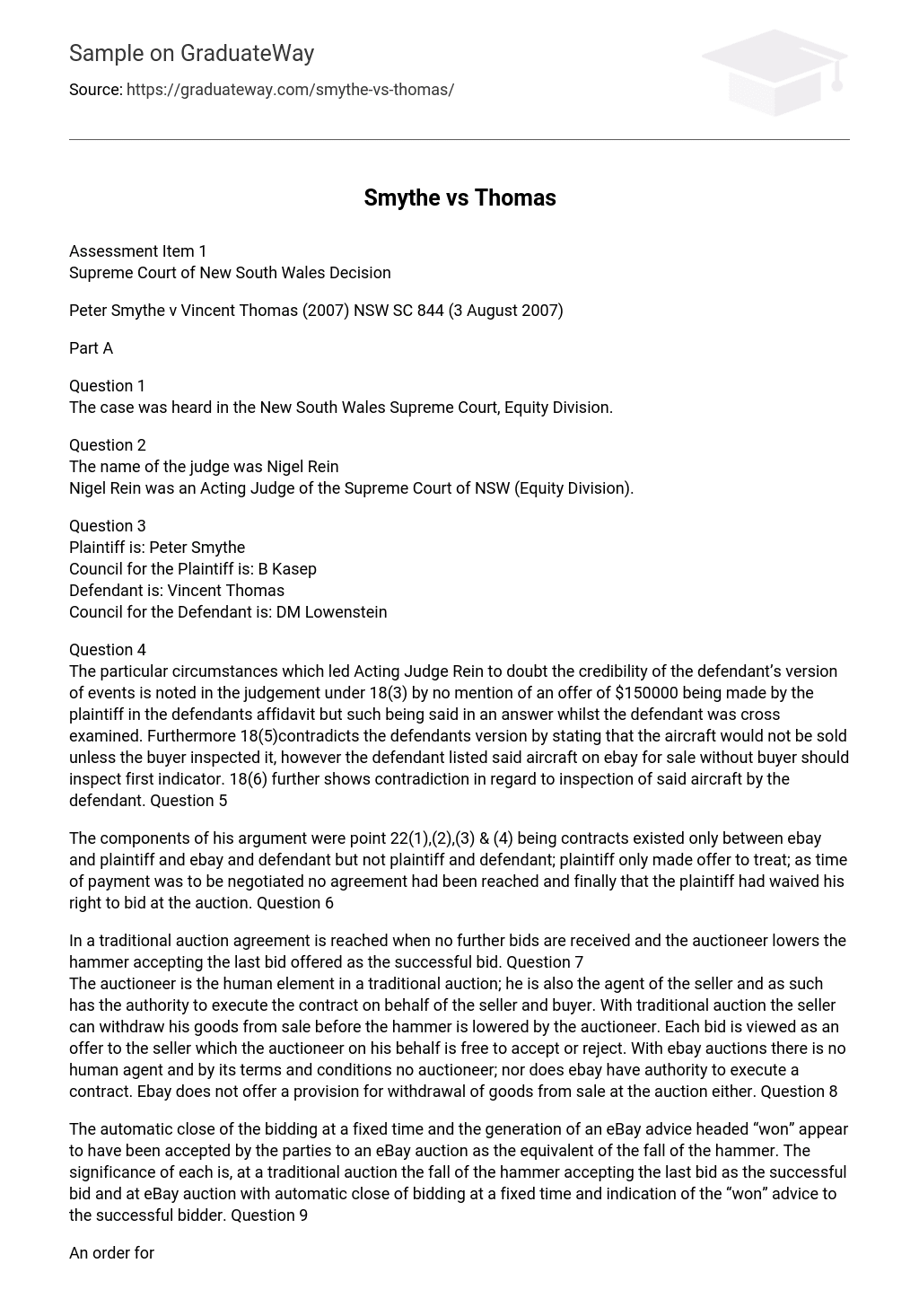The case was heard in the New South Wales Supreme Court, Equity Division. The name of the judge was Nigel Rein Nigel Rein was an Acting Judge of the Supreme Court of NSW (Equity Division).
The particular circumstances which led Acting Judge Rein to doubt the credibility of the defendant’s version of events is noted in the judgement under 18(3) by no mention of an offer of $150000 being made by the plaintiff in the defendants affidavit but such being said in an answer whilst the defendant was cross examined. Furthermore 18(5)contradicts the defendants version by stating that the aircraft would not be sold unless the buyer inspected it, however the defendant listed said aircraft on ebay for sale without buyer should inspect first indicator. 18(6) further shows contradiction in regard to inspection of said aircraft by the defendant.
The components of his argument were point 22(1),(2),(3) & (4) being contracts existed only between ebay and plaintiff and ebay and defendant but not plaintiff and defendant; plaintiff only made offer to treat; as time of payment was to be negotiated no agreement had been reached and finally that the plaintiff had waived his right to bid at the auction.
In a traditional auction agreement is reached when no further bids are received and the auctioneer lowers the hammer accepting the last bid offered as the successful bid. The auctioneer is the human element in a traditional auction; he is also the agent of the seller and as such has the authority to execute the contract on behalf of the seller and buyer.
With traditional auction the seller can withdraw his goods from sale before the hammer is lowered by the auctioneer. Each bid is viewed as an offer to the seller which the auctioneer on his behalf is free to accept or reject. With ebay auctions there is no human agent and by its terms and conditions no auctioneer; nor does ebay have authority to execute a contract. Ebay does not offer a provision for withdrawal of goods from sale at the auction either.
The automatic close of the bidding at a fixed time and the generation of an eBay advice headed “won” appear to have been accepted by the parties to an eBay auction as the equivalent of the fall of the hammer. The significance of each is, at a traditional auction the fall of the hammer accepting the last bid as the successful bid and at eBay auction with automatic close of bidding at a fixed time and indication of the “won” advice to the successful bidder.
An order for specific performance of the contract was appropriate as the item for auction was a Wirraway Australian Warbird Aircraft manufactured in 1944 and such item is deemed unique or of a special kind and where the award of damages would not be an adequate compensation to the buyer.
In point 76 Acting Justice Rein refers to a need to obtain further information to enable orders to be drawn up in an appropriate form however he does not think the matters to which he has referred to presents an obstacle to the order for specific performance. The matter was heard in the Supreme Court due to the unique nature of the item of the contract in dispute namely a Wirraway Australian Warbird Aircraft manufactured in 1944).
The valid offer was made orally by Tom to Dick. In case of acceptance Tom intended to be bound to the offer. The offer was communicated to Dick and he was aware of it. Offer was rejected. An oral counter offer was made by Dick to Tom. The offer was communicated and Tom was aware of it. Tom rejected this offer.
The sale to Harry is a valid contract constituting the essential elements of an agreement; offer and acceptance, intention, consideration, capacity, genuine consent and legality. The following conclusion can be drawn: Tom made an offer to sell his bike to Dick which was not accepted. A counter offer by Dick was rejected by Tom. Therefore no agreement has been reached between Tom and Dick. Subsequently Tom is able to deal with the bike as he wishes and he has reached an agreement with Harry regarding the sale of his bike.
For any agreement to be legally binding, the parties must have mutually intended for such to be recognised by the law (Gibson) 2005. In regards to arrangements or contracts of a social nature however, the assumption by the law generally is that the parties do not intend for such to be legally binding. In cases of participation in competitions and lotteries however consequences are more significant (Gibson) 2005 (4.45) Simkins v Pays (1955) 1 WLR 97 with the intention that such an agreement is legally binding.
Furthermore agreements in participation in competitions or lotteries have been held as enforceable by the courts. (Turner) 2009. (4.25) Trevey v Grubb (1982) 44 ALR 20 .As to the question whether Lotty is obliged to share the lottery winnings amongst the group the following conclusion can be drawn: There is mutual verbal agreement by the group to always share any winnings equally which renders the agreement legally binding. Even though the matter falls under agreement of social nature, it has been shown that the courts because of the more significant consequences in agreements in competitions and lotteries tend to find in favour of the plaintiff(s).
In the nature of agreements between parties in these circumstances in the event of gains (winnings) the enforcement of the agreement would have been contemplated prior of such occurring and therefore and as a consequence Lotty is obliged to share the lottery winnings amongst the group by view of legal precedent in such cases.





